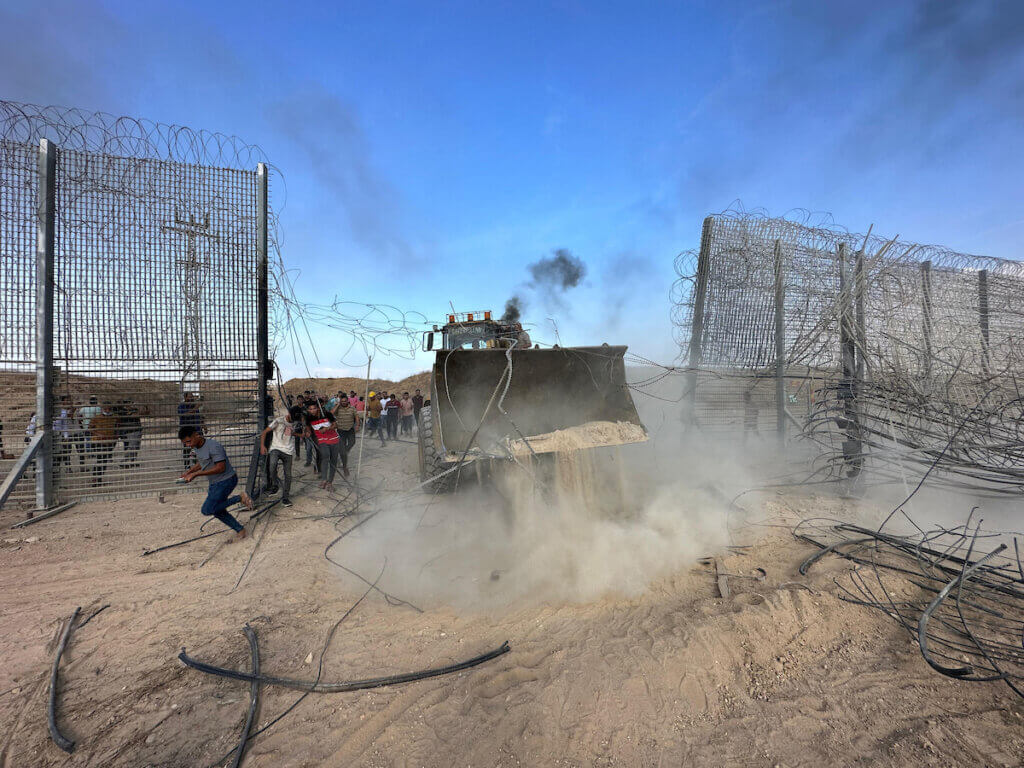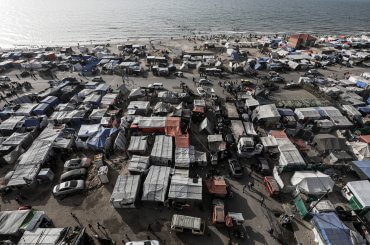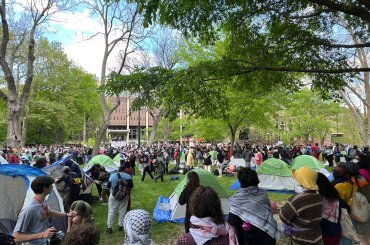“I held my gun so that the generations after me could hold a sickle”
Palestinian song, Ahd Allah Ma Nerhal (By God We Won’t Leave)
Decolonization is disruptive. It is a disruption to the status quo of the subjugation of the racialized, and thus dehumanized, Indigenous masses for the benefit of the settler-colonial class. It is a process that necessarily entails upheaval, social unrest, and conflict, paving the way for a new social and political order that reflects the aspirations and values of the liberated people.
Algeria, Haiti, and Vietnam’s years of bloody struggle all came to mind more than ever for Palestinians this week. In all these cases, their peoples courageously fought juggernauts of military power. They were told these powers were undefeatable, that they were undeserving of ruling themselves and controlling their own destinies, and that they would find the price too high to pay. Scorched earth tactics and guerilla warfare flipped the power dynamics on their heads, and the very infrastructure that had been used to exploit and suppress them was used to the revolutionaries’ advantage. In the case of the Vietnam Tet Offensive in particular, the timing, scope, coordination, media coverage, and psychological impact of their resilience eroded public support for the war. Could we perhaps bear witness to the same phenomenon today? In all these cases, their peoples decimated the physical and ideological barriers standing in the way of the new world they knew was on the horizon.
Palestinians, too, will reach this new world.
Much of the commentary around the “Al Aqsa Flood” operation, where Palestinian resistance fighters from Gaza broke free from the concentration camp we know as the Gaza Strip, dismisses or outright ignores two things that every Palestinian knows to be true:
1) There is no form of violence that Israel can hope to punish us with for the first time now. Massacres, home demolitions, life imprisonment sentences where prisoners are tortured and sexually assaulted, blockade and siege, execution in the streets. Over and over again, we watch funeral after funeral, and we know that in horror we will see many more.
2) We do not intend to remain a population of oppressed refugees and prisoners and denied access to the land that is our way of life forever.
Palestinian resistance is paving the way for the end of this violence and denial of land that has been Israeli colonialism.
This end is the beginning of Palestinians rebuilding our villages that were destroyed in the many massacres of 1948. It will be reparations to compensate for our homes that we were robbed of and everything stolen to bolster their libraries and museums from the Palestinians who were ethnically cleansed and, to this day, are deemed “absentees.” It will be us finally accessing our beautiful nature to farm and enjoy, free of the colonial bureaucratic structure in place currently preventing this. It will allow us to undo the political brainwashing that our lives are less full and deserving of being lived because we are not Jewish. This includes proving wrong the greenwashing that we don’t deserve the land because we don’t know how to take care of it and that they made the desert bloom when really all they did was take our homeland and turn it into a series of heavily surveilled ghettoes.
This will all start with Land Back, the call to return land to Indigenous peoples. Jaskiran Dhillon, an Indigenous scholar, defines Land Back as “a call for the return of Indigenous lands and a reimagining of Indigenous relations to the land, centered on autonomy and consent.” It is essential to decolonization because of how central it is to creating a new political and economic order for the Indigneous, rather than at their expense. Fanon put it in concrete terms: “For a colonized people the most essential value… is first and foremost the land: the land which will bring them bread and, above all, dignity.”
The resistance fighters came from the Gaza Strip, where the vast majority of the population are refugees ethnically cleansed from their villages, many of which have been destroyed and had settlements built over their remains, like Sderot. They have since been shoved into camps, where rather than having bread and dignity, they are denied access to food, water, and medicine. They have been living at the whim of the settlers who built their lives on the remains of their villages and lands.
From the moment those fighters flew in on paramotors, disrupting the parallel reality that was this music festival, they accomplished something profound (one must wonder what it felt like for these fighters to see a party just outside where they have been trapped under a suffocating blockade). They reimagined their relation to the land not as something in the distance but as a tangible place for them to set foot on. They entered the rest of their homeland not through a checkpoint hoping to be granted a permit, but as a force to be reckoned with. They were autonomous, enacting their will by force against this population of heavily militarized settlers, the very vast majority of whom have “served” or are currently in the Israeli military where careers are made out of Palestinian suffering and death. That moment when a (Palestinian! For Once!) bulldozer took down the fence was decolonization in practice: that fence, and the snipers behind it defending the settler-colonial order, were overcome.
The Palestinian resistance did nothing less than lay the groundwork for the end of violent Israeli rule over our lands. They did so by employing a violence to end the root cause of the oppression of Palestinians, not do another spin of the so-called “cycle.” As Paulo Freire put it, violence had already begun “with the establishment of a relationship of oppression…never in history has violence been initiated by the oppressed. How could they be the initiatiors, if they themselves are the result of violence?”
Or, as Palestinian author Mourid Barghouthi put it, the resistance rejected starting the story with “Secondly”:
“Start your story with “Secondly,” and the arrows of the native Americans are the original criminals and the guns of the white men are entirely the victim. It is enough to start with “Secondly,” for the anger of the Black man against the white to be barbarous, and the burned Vietnamese will have wounded the humanity of the napalm, and Victor Jara’s songs will be the shameful thing and not Pinochet’s bullets… It is enough to start the story with “Secondly,” for my grandmother, Umm ‘Ata, to become the criminal and Ariel Sharon her victim.”
Starting the story with “firstly” has made some uncomfortable; this is a testament to the decades of hegemony-building around who has the monopoly on violence. This same monopoly decrees who gets to be seen as full people with lives and loved ones and who are treated as numbers. Over and over again, in the West in particular, Palestinians have been relegated to the latter. Some of those appalled by armed Palestinian resistance and unable to see it for the defense that it is perhaps see themselves reflected in the Israeli settler-soldier rather than the Palestinian fighter. They may do so either because of their own role in a settler society or because they have never had to try to grapple with the physical and psychological existential threat level of violence Palestinians have been subjected to all our lives. Regardless, someone who thought decolonization would be an act of telekinesis or who only thinks about us when we’re trending is in no position to lecture.
Many Palestinians would have preferred to see the walls come down through boycotts and petitions and the other endless tried-and-not-true methods we have long been undertaking. But it was not the Palestinians who decided things had to be this way. Poetry and social media posts have gotten us imprisoned; we have marched unarmed and been met with tear gas and bullets; we have watched our children be put through military court, and our people and their bodies pulled out from under rubble, as they have been again and again in Gaza.
Palestinians know this annihilatory violence is being inflicted on the Palestinians of Gaza as this is being written. We also understand that when Israelis make jokes on Tik Tok about having access to water and electricity and about how “new real estate opening up”, it is the logical conclusion of Zionist settler-colonialism: as much of Palestinian land with as few Palestinians alive left on it.
But we have hope because we know, now more than ever, that these horrors in the name of upholding a racist settler-colonial occupation are not going to last forever. Anyone who ever thought it would will be astounded in hindsight.



None of us can predict accurately the medium term outcomes of this uprising by Hamas. However, it is not fair on the families of the dead killed by Hamas fighters to ignore that Hamas committed grievous war crimes by targeting civilians.
was nothing profound, as you claim. It was murdering young Israelis, many of whom were probably supporters of the Palestinian cause. How does that bring liberation closer? Instead, it brings shame and disgrace. I do understand that it was, in part, desperation and despair that non-criminal methods were not achieving anything. But to choose ordinary, non-combatant Israelis as their targets will likely not do so either.
To Rebecca Turner did you express such horror when Israel killed Palestinian Police cadets at their graduation. Perhaps you never even heard about it. I am tired of the world thinking Israel’s pain is far more important than that of Palestine what a wicked world we live in.